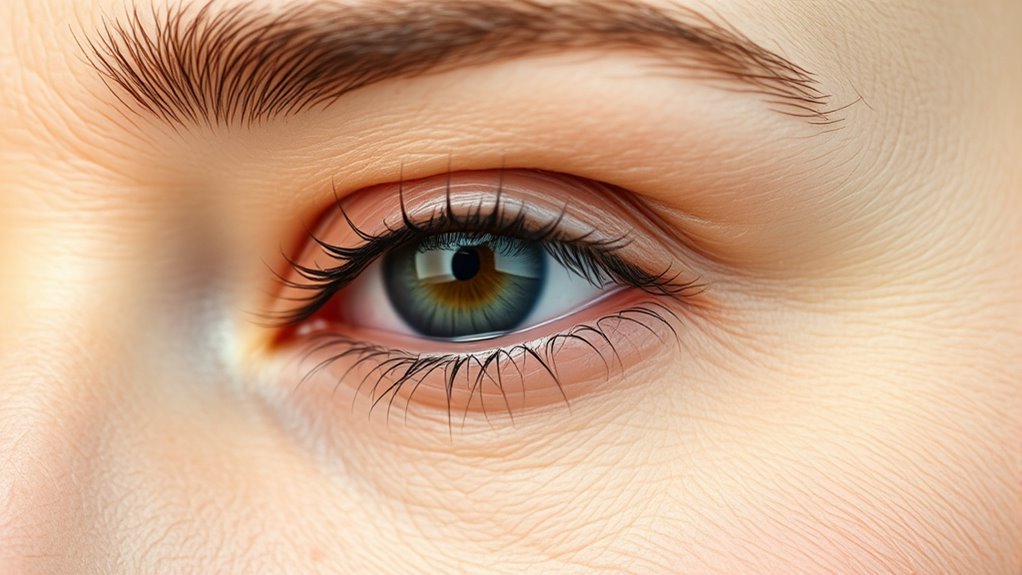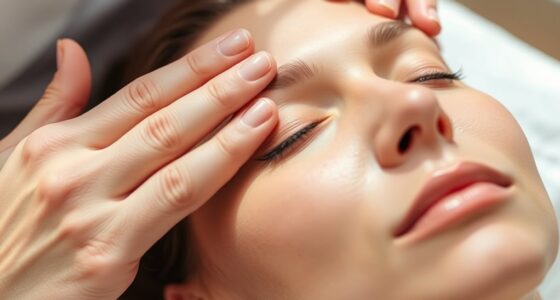The skin around your eyes is much thinner—about 0.5 mm—making it more delicate and prone to damage, wrinkles, and irritation compared to the thicker facial skin. It’s also more sensitive to environmental factors, requiring gentle care and specialized products. Sun protection and proper makeup techniques are essential to prevent early aging. To keep your eye area healthy and youthful, understanding these key differences is vital—continue exploring to learn how to best care for this fragile skin.
Key Takeaways
- The eye area skin is approximately 0.5 mm thick, significantly thinner than facial skin, making it more delicate and vulnerable.
- Due to its fragility, the eye skin requires gentler makeup application and specialized, sensitive skincare products.
- The eye area has less melanin and fewer oil glands, increasing susceptibility to UV damage, wrinkles, and dark circles.
- Facial skin is generally thicker, more resilient, and better able to withstand environmental stressors and cosmetic products.
- Proper care, including sun protection and gentle techniques, is essential for maintaining healthy, youthful eye skin compared to facial skin.

The skin around your eyes differs markedly from the rest of your face, and understanding these differences is key to proper skincare. This delicate area is much thinner, often only about 0.5 millimeters, making it more vulnerable to damage from environmental factors and aging. Because of its thinness, applying makeup requires a gentle touch—using lightweight products and minimal rubbing helps prevent irritation and dragging the skin. When it comes to makeup application, you should opt for creamy concealers and soft brushes to avoid tugging at the fragile skin, which can lead to the formation of fine lines over time. Moreover, due to its sensitivity, the eye area demands specific products formulated for that delicate skin, so avoid using the same makeup or skincare products you rely on for the rest of your face.
Sun protection plays a vital role in maintaining the health of your eye area skin. The skin around your eyes is more susceptible to UV damage because it has less melanin, which offers natural protection against harmful rays. Regularly applying a broad-spectrum sunscreen specifically designed for the eye area can substantially slow down the formation of dark circles, fine lines, and wrinkles. Remember, many sunscreens can be too harsh or irritating for this delicate region, so choose a mineral-based sunscreen or an eye-specific SPF product that’s gentle yet effective. Wearing sunglasses with UV protection also shields the skin from direct sun exposure and reduces the need to constantly apply sunscreen around your eyes. Staying consistent with sun protection not only prevents premature aging but also helps avoid pigmentation issues and other skin concerns that can arise from cumulative sun damage. Additionally, choosing appropriate skincare products formulated for sensitive areas can further enhance protection and skin health.
The differences in skin thickness and sensitivity between your eye area and the rest of your face mean you need to adapt your skincare routine accordingly. This includes being more cautious during makeup application—using minimal, gentle products—and prioritizing sun protection. When you understand the unique needs of this fragile skin, you’re better equipped to choose appropriate products and techniques that preserve its health and youthful appearance. Proper care can minimize the risk of damage, dark circles, and early signs of aging, ensuring your eye area remains vibrant and well-protected. Remember, investing time in targeted skincare for this area pays off in the long run, helping you maintain a fresh, youthful look for years to come.
Frequently Asked Questions
How Does Sun Exposure Affect Eye Area Skin Differently?
Sun exposure makes your eye area skin more vulnerable because it has higher sun sensitivity. UV damage can cause premature aging, wrinkles, and dark circles around your eyes. Since the skin here is thinner and more delicate, it’s less equipped to handle UV rays, leading to faster deterioration. Protect this area with sunglasses and SPF to prevent UV damage and maintain youthful, healthy skin around your eyes.
Are Specific Skincare Ingredients Better for the Eye Area?
Yes, specific skincare ingredients are better for the eye area. Look for eye-specific ingredients like peptides, hyaluronic acid, and caffeine, which target puffiness, fine lines, and dehydration. Incorporate these into your eye care routines for ideal results. You should avoid harsh ingredients like retinol or acids that can irritate the delicate skin around your eyes. Using tailored eye care routines with the right ingredients helps protect and rejuvenate this sensitive area effectively.
What Are Common Signs of Aging Unique to the Eye Area?
You’ll notice signs of aging around your eyes first, like fine lines and dark circles. These occur because the skin here is thinner and more delicate, making it more prone to showing aging signs. As you age, collagen loss and reduced elasticity lead to these issues. You might also see puffiness or sagging. To combat these, use gentle, targeted skincare products designed for the eye area and stay consistent.
How Often Should Eye-Specific Treatments Be Applied?
Ever wonder how often you should treat your delicate eye area? To combat eye puffiness and dark circles effectively, apply eye-specific treatments twice daily—morning and night. Consistency is key, but avoid overdoing it to prevent irritation. Regular use helps reduce signs of aging and keeps your eye area looking refreshed. Isn’t it worth investing in your skin’s health for a brighter, more youthful appearance?
Can Facial Moisturizers Replace Eye Creams Effectively?
You shouldn’t rely solely on facial moisturizers to replace eye creams because they serve different purposes. While a good moisturizer provides overall hydration, an eye cream targets delicate skin around your eyes, addressing issues like puffiness and fine lines. For ideal eye area hydration, use an eye cream formulated specifically for that sensitive zone, as it contains ingredients that penetrate better and deliver targeted benefits unlike standard facial moisturizers.
Conclusion
Did you know the skin around your eyes is about 10 times thinner than your facial skin? That’s why it’s more prone to wrinkles and aging signs. By understanding these key differences, you can better tailor your skincare routine and protect this delicate area. Remember, taking extra care of your eye area now can make a big difference in maintaining a youthful, refreshed look for years to come. Your eyes deserve the same attention as the rest of your face!









